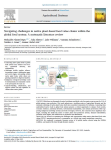Dipu M.A., Checco J., Williams L., Sultanbawa Y., Jones N.A., Abdul Aziz A. (2025). Navigating challenges in native plant-based food value chains within the global food system: a systematic literature review. Agricultural systems, 01/08/2025, vol. 228, p. 104373.
https://doi.org/10.1016/j.agsy.2025.104373
https://doi.org/10.1016/j.agsy.2025.104373
| Titre : | Navigating challenges in native plant-based food value chains within the global food system: a systematic literature review (2025) |
| Auteurs : | M.A. Dipu ; J. Checco ; L. Williams ; Y. Sultanbawa ; N.A. Jones ; A. Abdul Aziz |
| Type de document : | Article |
| Dans : | Agricultural systems (vol. 228, August 2025) |
| Article en page(s) : | p. 104373 |
| Langues : | Anglais |
| Langues du résumé : | Anglais |
| Catégories : |
Catégories principales 06 - AGRICULTURE. FORÊTS. PÊCHES ; 6.1 - Généralités. Situation AgricoleThésaurus IAMM PRODUCTION VEGETALE ; PLANTE ; VARIETE INDIGENE ; CHAINE DE VALEUR ; SYSTEME AGROALIMENTAIRE ; SECURITE ALIMENTAIRE |
| Résumé : | CONTEXT While there are thousands of native food plants worldwide, only four major crops account for 50 % of global primary crop production. This trend underscores a troubling erosion of agricultural diversity and the systematic sidelining of native plant foods, which have nourished communities for millennia. Connecting these underutilized native foods to global food systems presents a critical opportunity to enhance food security, economic resilience, nutritional diversity, environmental sustainability, and cultural preservation while supporting Indigenous knowledge systems and food sovereignty. However, this connection faces significant challenges, including the small-scale nature of native plant food production systems, demand vulnerabilities, persistent social stigma, and inefficiencies in production and distribution. OBJECTIVE We focused on examining the challenges and opportunities within native plant-based food value chains (NPFVC), spanning production to consumption, as a critical step towards mainstream connection. METHODS We conducted a systematic literature review of 40 global studies, selected using the PRISMA workflow, and analyzed the data through thematic analysis. RESULTS AND CONCLUSIONS The findings highlight that native plant-based food production systems are typically localized and deeply tied to Indigenous communities, yet the cultural contributions of these communities are often undervalued. A lack of support services, collaboration, and trust within the value chain undermines opportunities such as resilient production systems with low costs, livelihood benefits for communities, increased consumer demand, and willingness to pay premiums. Interventions in the areas of capacity building, industry collaboration, awareness initiatives, and support systems may help capitalize on climate-smart native plants and their low-input sustainable production systems. SIGNIFICANCE The study provides valuable insights into the native food system for chain actors, policymakers, and practitioners. It also contributes to broader discussions on food security, environmental sustainability, Indigenous contributions, and cultural preservation, emphasizing the integration of these critical elements into future global food system policies and practices. |
| Cote : | En ligne |
| URL / DOI : | https://doi.org/10.1016/j.agsy.2025.104373 |







